Your cart is currently empty!

How to overcome weight bias and fat phobia
Expect to have some weight bias
Now that my daughter is independent and well, my world is full of social dancing. Our teachers write on WhatsApp groups, 'Life is short… Go out dancing!', 'Fun and friends!', "Dance to express, not to impress!', 'Dancing is life!' These messages make me grin.
But some make me weep: 'A fun way to lose the fat!'
A while back a young woman appeared at a beginners' salsa class. I said, 'I hope you'll love it!' She said, 'Will it help me lose weight?'
Another time, during a meal with friends, one of them starts talking about how she's on a drive to love her body and finally lose some fat. She prods some thin part of her thin body. Across the table, my large friend has frozen, mid-bite.
These are examples of fat stigma, including internalised fat stigma. Most people don't even notice the problem. There's an assumption that we all want to lose weight.
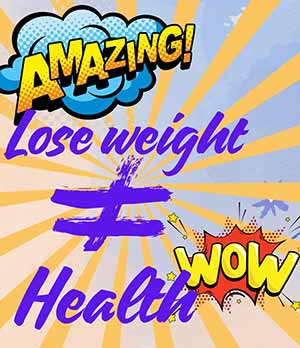
How many health tips are we exposed to every day, that conflate wellbeing with weight loss? 'Eat more veg, more fibre, exercise this way rather than that way, and you'll feel great… and lose weight'. As if low weight was the same thing as health.
On this page I'm offering a compilation of resources that help us combat weight bias. I'm also listing some body image resources to help you if your child has an eating disorder.
Weight bias, or fat stigma, or fatphobia (like 'homophobia'), are part of the fabric of our society. They mean that we jump to assumptions or judgements about people's health and people's moral fibre, based on their body shape. While the health messaging (from our doctors, our clinicians) can appear both scientific and caring, in practice it can do a lot of harm and be rooted in unconscious bias.
Body acceptance, Health At Every Size (HAES), intuitive eating and non-diet dietitians
To help educate us out of our prejudices, we can engage with resources from those who promote a neutral or positive attitude to body shape, to food and to exercise.
All this helps us go around society without adding to the prejudice. It helps young parents bring up their children in ways that counteract the body-shaming, appetite-shaming talk that is all around us. And if your child has an eating disorder it helps you get your head around what you're aiming for: what is total recovery? If your child is almost recovered but still struggling with their body image, or with hunger cues, following the trail of resources below might help you find a great clinician.
So in no particular order, here's a rather random compilation of some of the resources I've engaged with at various times. Start with any of those and it will open up a much bigger world of activists for social justice, who work to make life good for people in all bodies.
What is weight stigma and why should we care?
As always, Lauren Muhlheim's writing is clear and concise: read this here.
Health at Every Size (HAES)
HAES is a framework that many activists subscribe to.
To learn more about HAES, see the international Association for Size Diversity and Health (ASDAH), which is committed to size inclusivity in health.
HAES can be misunderstood. Some people think that HAES enthusiasts claim that all fat people are healthy. A fast way of better understanding HAES is to google the cartoon, 'Doctor! I've been impaled!'
In general, you want your eating-disorder clinicians to subscribe to HAES or similar:
Dr Rebecka Peebles explains HAES in this talk on eating disorders in a weight-biased world:
For a short read: HAES® is a Cornerstone for Recovery by Lisa Pearl
I found these two women fantasztic: Judith Matz and Lisa Erlanger, in ANAD's webinar on weight stigma and on HAES:
This webinar 'Body Acceptance 101 – Healing negative body image' by Balance Treatment Center also provides great education on HAES. The speaker is Dani Bryant:
Intuitive eating
I recommend the book and the audiobook (they're different) by dietitians Evelyn Tribole and Elyse Resch. The created the concepts of intuitive eating (which include attitudes to exercise and body shape). Learn from them before googling randomly, as the term has been hijacked by people who use it to justify restricting (sigh…). Note that the term 'body positivity' has also been spoiled: glossy photos of thin young women holding up a plate of salad and celebrating their body positivity.
Non-diet dietitians and others embracing social justice
Christy Harrison, US dietitian, has great resources — you could start wtih the 15mn free audioguide from her website.
Fiona Willer, 'non-diet dietitian' in Australia, spells out what the science says. Listen to her first batch of podcasts 'Unpacking weight science' e.g. the history of how BMI came about and how overnight, people went from healthy to unhealthy! She trains other professionals. SHe's on healthnotdiets.com and on fionawiller.com
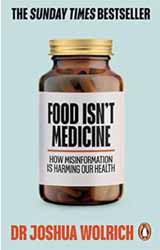
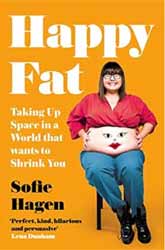
Joshua Wolrich's book, Food isn't Medicine, is a great, impassioned read that's fun to read.He's a UK doctor, training in nutrition, so he understands how doctors are trained to equate health with BMI. I appreciate how, unlike some activists, he's ready to take a cool, scientific look at various health issues to question whether fat is or isn't relevant to them.
Laura Thomas is a UK registered nutritionist specialising in Intuitive Eating, Health at Every Size & Non-Diet Nutrition. I came across her in a webinar (and also when I was googling for commentary on a popular diet program that — like many – is officially about wellbeing but keeps mentioning how it will make you lose weight.) She's got good articles. Listening to her podcasts will open up a huge world of activists: https://www.laurathomasphd.co.uk/ and https://substack.com/@laurathomas
Comedian Sofie Hagen's book really raised my awareness of the fat-shaming that some people endure in every detail of their lives. It's not particularly scientific, but it may give you the courage to speak up when you hear casual prejudice.
I enjoy the passion, hilarity and sparkling intelligence in the podcast 'Maintenance Phase'. The two presenters dismantle social justice weight issues, armed with science and personal experience. You could start with this episode: Anti-Fat Bias. Like Sofie Hagen's book, it did lots for my awareness of living as a fat person in our shaming society.
More muted and extremely moving, is Nicole McDermid's 'Open letter to the eating disorders community', where she describes the harm done when treatment providers have no awareness of their fat prejudices.
To help you raise your children
For some really practical ways to talk with our children about their body, food, heath and exercise, my favourite source is FBT therapist Zoë Bisbing, who provides excellent posts and recorded webinars on bodypositivehome.substack.com. I find these to be wonderfully compassionate, accepting of life's messiness, and rooted in the real world. She helps us parents work through our own biases, and presents down-to-earth tips for feeding our children and responding to their questions. This is my current go-to for parents wanting to raise children to be resilient to fat-shaming and distorted eating. If the moderate subscription fee isn't too big a stretch, go for it.
You can hear both Zoë Bisbing and Leslie Bloch gathering expertise from many other professionals in their podcast The Full Bloom Project. I enjoyed the first series and was a guest in one of the episodes.
You'll also get help from the book "Raising body positive teens" by Signe Darpinian, Wendy Sterling and Shelley Aggarwal. It includes intuitive eating. I review it here.
"Fat Talk: Parenting in the Age of Diet Culture" by Virginia Sole-Smith has got me even more aware of the culture we're in, and its toxicity. I also review it here.
And if your child has an eating disorder
In my book and my Bitesize audio collection, I suggest a range of ways you can talk about weight and body shape when your child has an eating disorder.
I also recommend resources, such webinar: 'Addressing body dysmorphia and body image in eating disorder recovery' by Marisol Perez.
I also recommend this fantastic webinar : 'Helping loved ones cope with negative body image and body dysmorphia' by Anita Federici. It is part of the FEAST of Knowledge 2025 series so you'll need to buy access here. I think it's well worth it as several of the other talks in the series are top notch.
I've also found this book very informative: 'The parents' guide to body dysmorphic disorder' by Schnackenberg, Monzani and Jassi. It's not particularly about eating disorders, but the similarities in what to say, and what not to say, are uncanny. The insights from this book will no doubt help many parents of a child with anorexia.
If you're looking for exposure therapy for body image, see my review of Glenn Waller's books here.
Health promotion
Health promotion is problematic when it implies that having an average BMI is the same as being in good health. And when it preaches exercise and nutrition without any sense of balance. In other words, most health promotion is done in a problematic way.
Many of our children started dieting and over-exercising after absorbing crude health promotion messages.
This is a great overview of what we know about health campaigns: Jacinta Tan, Suzana Corciova and Dasha Nicholls (2019) 'Going too far? How the public health anti-obesity drives could cause harm by promoting eating disorders' in Developments in Neuroethics and Bioethics, 2019
See also my page on health promotion in schools.
Is weight-stigma affecting your child's weight-recovery?
Head over to my page: Weight-restoration: why and how much weight gain? On healthy weight for eating disorder recovery: why weight gain; how much; danger of a low target weight; buffers, overshoot, and ‘stuck’ patients.
If you have a choice of clinicians, check out those who use some of the keywords on this page, as it shows they're aware of weight-bias and can help combat it.
More
- For lots from me on weight recovery target weight: Weight-restoration: why and how much weight gain? Briefly: it's as imprecise as a weather forecast so don't get caught up in numbers.
- What do you reply to, "Am I fat?" when your child has an eating disorder? is a brief post from me.
- Lots of suggestions regarding those "Am I fat, will you make me fat?" questions: Chapter 14 of my book, and many Bitesize audios.
Lots more resources on weight stigma
I am well impressed by this resources page from WeightStigmaAwarenessWeek. Loads of books, podcasts and so on, for us all to keep learning. A fish may not be aware of the water they swim in, but hopefully each of us do can get do better.
And to help you search for more, here are some hashtags that Zoë Bisbing suggests in bodypositivehome.substack.com.
#BodyLiberation
#FatLiberation
#Fatpositivity
#Body-positivity
#BodyDiversity
#AllBodiesAreGoodBodies
#NormalizeNormalBodies
#AntiDietCulture
#RadicalBodyLove
#RealBodiesUnite
#RepresentationMatters
Last updated on:



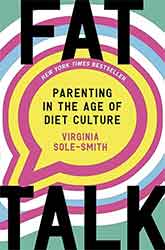
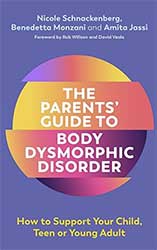
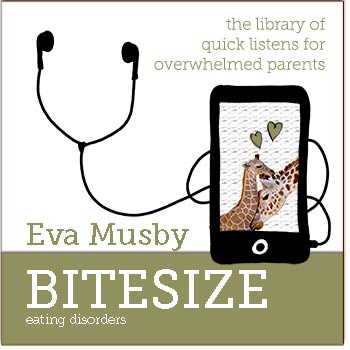


LEAVE A COMMENT (parents, use a nickname)